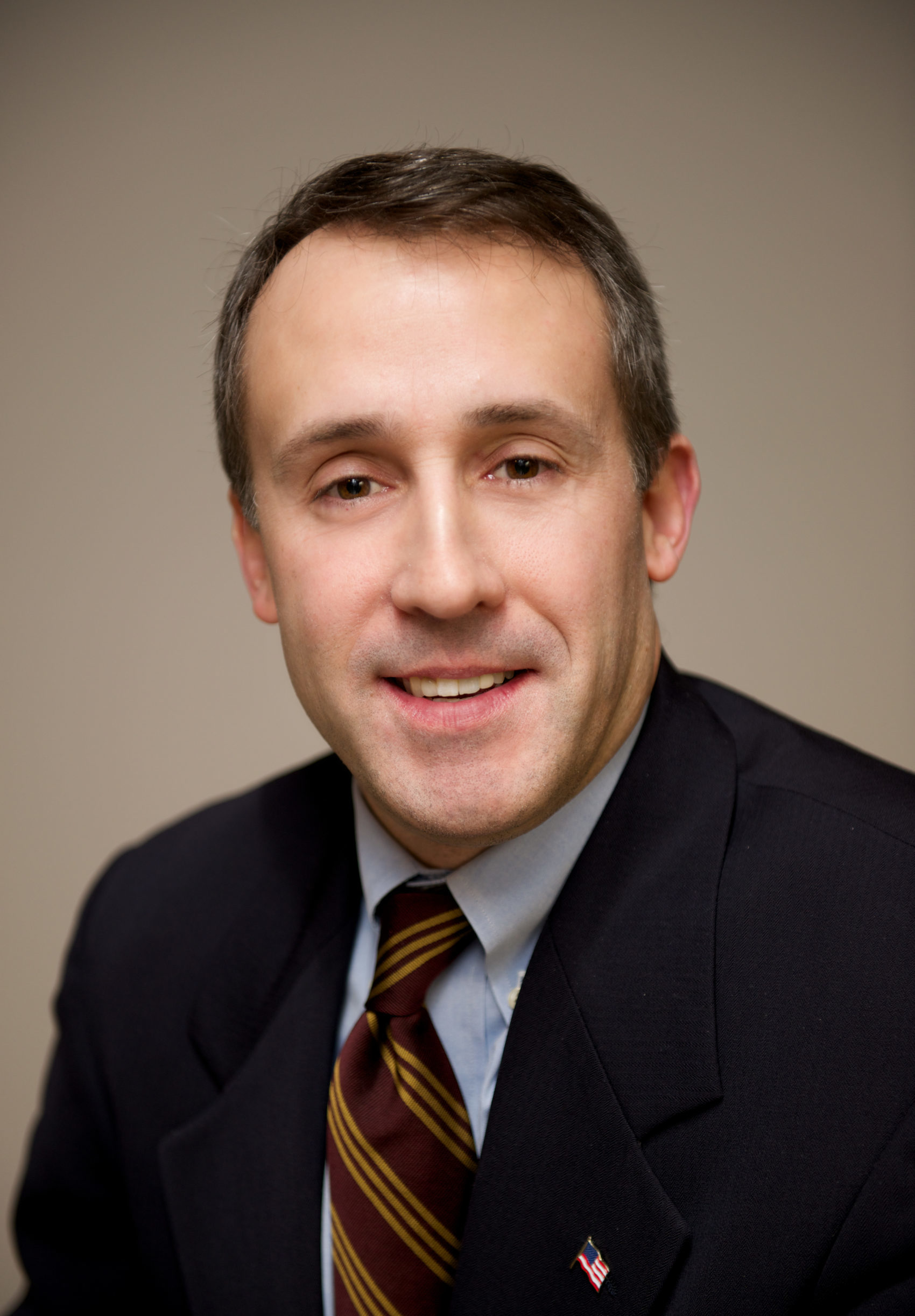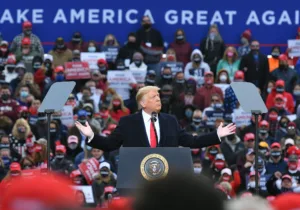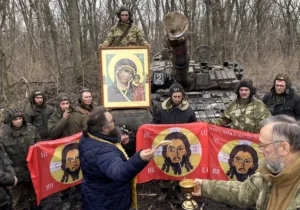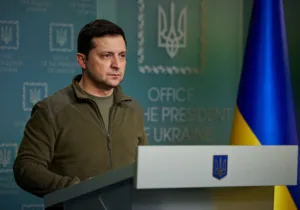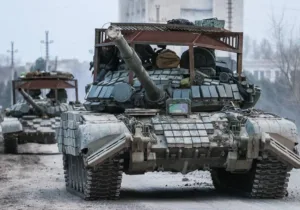As we approach the first anniversary of Vladimir Putin’s invasion of Ukraine, one of G.K. Chesterton’s most profound observations keeps coming to mind: “The true soldier,” Chesterton explained, “fights not because he hates what is in front of him, but because he loves what is behind him.” Against all odds, a people’s army of students and soldiers, farmers and techies, shopkeepers and artists, young women and old men has beaten back, ground down, outwitted, outmaneuvered and outfought Putin’s invasion force—in large part because they love their families, their fellow Ukrainians, their freedom and their homeland.
But in the dark shadows of what Putin’s army has done in Ukraine, the Ukrainian people can be forgiven if they are motivated not just by love of their country and their countrymen, but also by a deep and righteous hatred for their enemy.
The World’s Largest Crime Scene
In every way, Putin has perpetrated a conflict characterized by war crimes against Ukraine. Ukrainian investigators and international observers report that the Russian Federation and its military, security forces, intelligence agencies, and military contractors have committed at least 58,000 war crimes in Ukraine. That number grows by the hour.
The first of these war crimes, it must not be forgotten, is the very way the war started: Both the 2014 assault on Crimea and the 2022 full-scale invasion of the whole of Ukraine constitute a war of aggression by the Russian Federation against Ukraine, a sovereign independent country that had neither attacked nor threatened Russia. However, this is quite literally only the beginning of Putin’s war of war crimes.
Much of the immorality Putin and his invasion forces have committed against Ukraine is too gruesome to describe in this space. But here’s the PG-13 version of Russia’s atrocities in Ukraine: targeting and destroying hospitals, including maternity hospitals; targeting and destroying civilian population centers; targeting civilian energy, food and water supplies; damaging or destroying 93 schools and some 270 places of worship; torturing and massacring civilians; engaging in mass-looting of Ukrainian property and Ukrainian cultural artifacts; abducting Ukrainian children and placing them in Russian homes in order to forcibly Russify them and thus serve Putin’s larger goal of erasing Ukraine; imprisoning Ukrainian civilians in “filtration camps;” forcibly transferring as many as 1.6 million Ukrainian civilians to Russia; attempting through deportations and disappearances “to change the demographic makeup of parts of Ukraine,” according to a State Department report; desecrating and mutilating dead combatants; conducting a campaign of mass-rapes and employing sexual violence as part of their “military strategy,” in the words of a UN official.
The U.S. Helsinki Commission (an OSCE-linked body comprised of members of Congress and executive-branch appointees) reports that Russia’s military has “decimated hospitals, schools and apartment buildings, including a theater in Mariupol where hundreds of children were sheltering and the Kramatorsk rail station where thousands were waiting to escape the Russian onslaught.”
Historians and humanitarian-law experts who spoke to the commission in November “unanimously agreed” that “Russia’s invasion of Ukraine meets the definition of the term genocide as defined by the Genocide Convention”—namely the “intent to destroy, in whole or in part, a national, ethnical, racial or religious group.” According to the commission: “Rarely has genocidal intent and pattern of action been so clearly telegraphed and demonstrated for the world to see.”
Secretary of State Antony Blinken labels Putin’s war of war crimes “a deliberate campaign to kill, to torture, to rape, to commit atrocities” and the U.S. is not alone in these grim conclusions. Pointing to “torture,” “unlawful confinement,” “executions,” and “sexual and gender-based violence” against girls as young as four and women as old as 82, a special UN commission definitively concludes that “war crimes have been committed in Ukraine.”
Karim Khan, chief prosecutor for the International Criminal Court (ICC), describes the whole of Ukraine as “a crime scene.” Spurred by 43 member states, the ICC dispatched investigators to Ukraine and has begun assembling the evidence and infrastructure necessary for the largest war crimes trial since Nuremberg. (Toward that end, Ukraine has identified some 600 Russian political officials and military commanders for the prosecution of war crimes.)
EU bodies are pushing for an international tribunal to investigate, prosecute and punish Russian war crimes. Citing “escalating acts of terror against Ukrainian civilians,” “deliberate attacks and atrocities committed by Russian forces and their proxies against civilians in Ukraine,” “the destruction of civilian infrastructure,” and “other serious violations of international and humanitarian law,” the European Parliament recently declared Putin’s Russia a state sponsor of terrorism.
Soldier and Sword
Chesterton’s insights about the “true soldier”—the noble warrior who loves what’s behind him so much that he will risk and sacrifice his own life, who fights for a just cause in a just manner, who believes that right makes might—can also be applied to Putin’s army of criminals, albeit in the opposite manner.
Putin has propagandized his subjects and soldiers into hating and dehumanizing what’s in front of them—the Ukrainian people—by pushing the lie that Ukraine is “not a real country,” that Ukraine was “entirely created by Russia,” that Ukraine is governed by “a gang of drug addicts and neo-Nazis.” The irony—obvious to everyone outside the propagandists defending Putin’s war of extermination and annihilation—is that by concocting phantom enemies, revising and rewriting history, trying to rebuild a dead empire, waging a war of aggression, and engaging in genocide, Putin is the one who’s imitating the Nazis. Putin, like the Nazi high command, knows it’s easier for soldiers to destroy what they’ve been taught to believe is not human and not real.
This is the sort of thinking, the sort of worldview, the sort of behavior that people of faith and goodwill must hate. Some may gasp at such a notion and counter that “Hatred cannot be righteous.” Yet the psalmist (“I behold the treacherous and loathe them”) and Solomon (“The fear of the Lord is to hate evil”) suggest it can. Paul’s letter to the Romans literally instructs us to “hate what is evil.” And it pays to recall that, in this same letter, Paul reminds all those with ears to hear that governing authorities bear the sword “to execute wrath on him who practices evil.”
Putin’s motivations, means, methods, and ends in Ukraine are evil. Ukraine’s response is right and righteous. Of course, the Ukrainian people and their political leaders must guard against allowing their righteous rage—their hatred for Putin’s evil—to devolve into the very same sort of ends-justify-the-means mindlessness that would dehumanize the Russian people. Given what Putin’s army has done, that will take enormous moral and political will—and perhaps generations.
For now, the United States and its allies should send the Ukrainians everything they need to clear a pathway to their vision of postwar peace and secure what they define as victory, everything they need to protect their innocents and liberate their blood-soaked land, everything they need to clear their skies and open their ports, everything they need to defeat the evil thrust upon them.
